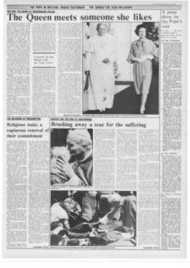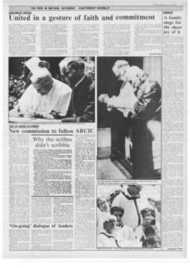Page 4, 4th June 1982
Page 4

Report an error
Noticed an error on this page?If you've noticed an error in this article please click here to report it.
Tags
Share
Related articles
Bread Of Life Of The Pastoral First Priority Ministry
Wholehearted Response To The Council
'christ Enables Us To Overcome The Bewilderment Of The Age'
‘we’re Not Bound To Believe That There’s Anyone In Hell’
Millennium Hopes Of The Catholic Bishops Of England And...
ADDRESS TO BISHOPS OF ENGLAND AND WALES
Appeal for collegiality
My dear brother Bishops.
As we come together we turn our thoughts immediately to our Lord Jesus Christ. In the Gospels. Christ tells us he is not alone. He experiences communion with his Father: "And he who sent me is with me; he has not left me alone
On another occasion he says: "I am not alone, for the Father is with me". Christ's consciousness of being one with his Father pervades his life and his mission. It is a source of strength for him. Even at the height of his Passion, he knows that he is not abandoned.
Christ also knows that his disciples have the very same need as he had: they 1111151 norlace their mission alone. And so he made his promise, a promise that
pervades the life of the whole
Church, for ever: "I am with you always, to the close of the age"., This promise was the echo of promises that God had made before. Moses had heard God say:
"I will be with you" that he could lead God's people into freedom.
Jeremiah, who was to shrink in fear before the magnitude of his prophetic task, was reassured by God: "I am with you to deliver you The Apostle Paul. too, heard reassuring words: "Do not be afraid but speak and do not be silent, for I am with you ..."
And today, in the context of the collegiality that we are celebrat ing, I wish to offer for your meditation Christ's promise to remain with his Church, Christ's assurance that you are not alone.
The principle of collegiality shows us how Christ's own con viction about himself — "I am not alone" — applies to ourselves.
Through the action of his Holy Spirit, Christ is with you and in you, as you preside, as his vicars over the Churches entrusted to your pastoral care. He is also close to you through the ministry of him to whom the Church attributes in a special way the titles of Vicar of Christ and Servant of the Servants of God.
All of you together, as a Conference — the Latin Rite
Ordinaries as well as Bishop
Hornyak, beloved pastor or the Ukrainian faithful — know the
solidarity of The Bishop of Rome with you in prayer and fraternal love.
And as tnetnbers of the worldwide College of Bishops, you know that you have the support of the Successor of the Apostle Peter who was made "a permanent and visible source and foundation of unity of faith and communion", precisely "in order that the Episcopate itself might be one and undivided".
In the past weeks the Pope has been close to you, as he has been close to your Argentine brothers in the Episcopate, in the great pastoral need that has been experienced by both your peoples as the result of armed conflict in the South Atlantic.
At the same time, you and the Bishops of Argentina have been assured of the prayers and fraternal support of your brother Bishops throughout the world. The concelebrated Mass in Saint Peter's Basilica on 22nd May was, among other aspects, an example of the powerful collegiliaty that transcends natural boundaries, languages, cultures and even generations.
The appeal for peace made at that time was a collegial act in favour of the whole Church and all humanity. The Episcopal College stands by its individual members. Problems are the concern of the whole body. You are not alone.
You in your turn are called upon to collaborate for the good of the universal Church. Some of you had the privilege, as I did, of taking part in the Second Vatican Council.
All of you have contributed in one way or another to the work of the Synod of Bishops or to that of your Episcopal Conference.
At the same time the universal Episcopate with which you have worked for the good of the whole Church collaborates with the Roman Pontiff in important matters that touch your local Churches.
This aspect, too, is a vital part of collegiality: not only do you collaborate for the good of others, but you accept the collaboration of the College in your own ministry.
That collaboration is offered in rious ways, often in nonuridicial ex7essions,_and it is a great help to you. In this aspect of collegiality you yourselves are helped to read accurately the "signs of the times", to discern clearly "what the Spirit says to the churches".
It is in this context of collegiality that we see how the local Churches and their pastors contribute to the universal Church, and also how they receive the combined insights of the universal Episcopate.
These insights assist local Bishops to be ever more solicitous for the good of the whole Church; they likewise help the Bishops to safeguard in their local Churches that unity of faith and discipline which is common to the whole Church and which must be authenticated by her universal authority.
In your ministry as Bishops you know how much your priests depend on you, and how much you depend on your priests. Together — and not alone — you have been commissioned to proclaim the Gospel and build up the Body of Christ.
The priests are your brothers and the co-workers of your episcopal order. Your brotherhood with them ensures the effectiveness of your ministry, and their union with you guarantees their union with Christ.
Now a word about Religious. The Second Vatican Council and its implementing documents have done much to show the genuine place of Religious in the apostolate of the local Churches.
Here too your role is so important, not only for the coordination of pastoral activity but also for ensuring that the splendid contribution of men and women Religious is adequately utilized in the spirit of shared responsibility for the Gospel, "that the word of the Lord may speed on and triumph".
In your pastoral zeal, the orderly and fruitful collaboration between Bishops and Religious will confirm your own joyful experience of not being alone in the work' of evangelisation and catechesis.
I am deeply convinced also that the increased scope of the lay apostolate is a source of special strength for you as pastors of God's people. The Second Vatican Council was emphatic in stating how much the laity contribute to the welfare of the entire Church.
In the same context it states that "pastors also know that they themselves were not meant by
Christ to shoulder alone the entire saving mission of the Churzh". By fulfilling their own proper role, the laity are meant to offer a great service of loving support to their pastors in Christ.
In all of this, the task of the Bishops remains formidable. It is a ministry of heavy responsibility, but the presence of Christ and the right measure of shared responsibility assumed by the community is more than enough to convince us all as Bishops that we are not alone.
There are so many ways in which we are called to serve as Bishops; as teachers, leading God's people "by right paths for his name's sake as leaders of liturgical worship, offering "praise in the vast assembly" as loving and compassionate shepherds. In all these ”arious areas the principle of collegiality finds its pertinent application, and the fife and ministry of the Bishop is marked by the experience of Christ the chief Shepherd, who proclaims unceasingly to the world: I am not alone.
And today, dear Brothers, the Bishop of Rome emphasises this point strongly: that like Christ you are not alone. With you the Bishop of Rome is pastor of God's people, and for you he is the universal servant pastor. As he confirms you in the faith, he also encourages you and your people — as well as your Argentine confreres and their people — in every effort for total reconciliation and peace.
And together, my brother Bishops — and not alone — we tnust proclaim that peace is possible. that it is a human and Christian duty, that reconciliation is the way to peace, and that Christ himself is our justice and our peace. The Catholic Episcopate is jointly accountable to Jesus Christ for the way in which it proclaims. in his name and by his mandate, his Gospel of peace, and exercises his "ministry of reconciliation".
United with one another, let us proclaim the saving and reconciling message of the Gospel, with a deep conviction that — like Jesus and with Jesus — we are not alone. In the collegiality of_the Catholic Episcopate let us find renewed strength and vigour to lead God's people. And in Christ Jesus may we always realize that we are not alone.
blog comments powered by Disqus























